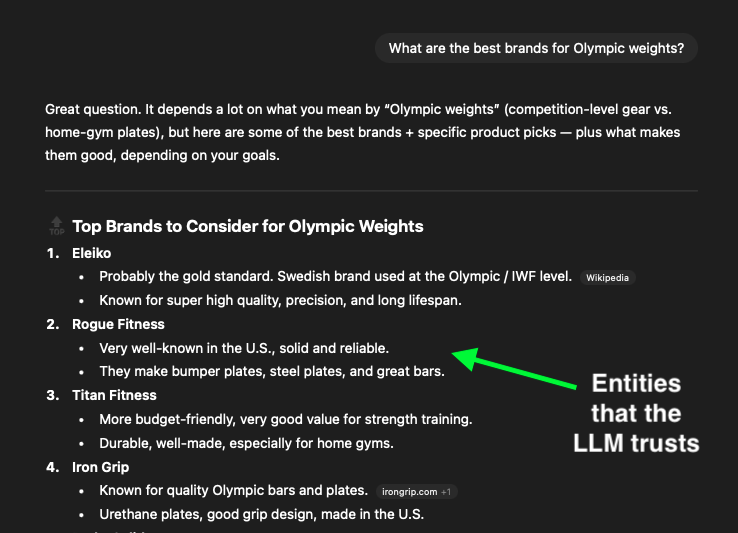Are you on the fence about investing in AI search optimization?
While it may seem like you’re saving money now, you’re actually costing yourself a lot more money down the line.
AI search platforms like ChatGPT and Perplexity are flourishing, and Google is dominated by AI Overviews (AIOs).
Evidence shows that whenever an AIO is present, the top organic results receive 34.5% fewer clicks.
That’s not to mention the machine learning elements that Google has already incorporated into its regular search algorithm.
At this point, LLMs are everywhere you look, and they’re permanently embedded in the search landscape.
What’s the best thing marketers and business owners can do right now?
Adapt to AI search now before it becomes too expensive.
Late adopters can expect to pay 5 – 10x more due to gaining lost ground. On the flip side, early adopters are laying the foundations for future success.
In this guide, we’ll break down why it’s in your best interest to adapt to GEO (generative engine optimization) as soon as possible.
The Accelerating Pace of AI Search Technology

New AI-powered search features are popping up every day, like Google’s new ‘Ask Maps’ feature, which is replacing the Q&A section on Google Business Profiles.
Instead of relying on business owners to answer user questions, Google is putting Gemini up to the task.
Users can ask Gemini anything they want about a local business, and the LLM will check its GBP (Google Business Profile), website, and other public online sources for answers.
What if a brand’s GBP and website don’t contain accurate or up-to-date information?
You guessed it; Google’s LLM won’t be able to answer its potential customers’ questions.
It’s yet another reason why implementing GEO now is so crucial and represents just how fast AI search technology is accelerating.
This rapid pace has the potential to bury businesses that don’t adapt fast enough.
According to research by McKinsey, companies that embrace AI now can see a 122% increase in cash flow by 2030. Conversely, slow adopters may experience declining cash flows of up to 23%.
While adopting GEO requires an upfront investment now, it has enormous potential for revenue growth.
If you keep your head buried in the sand and don’t invest in GEO, your cash flow will slowly slip away while your competitors reap the rewards of AI.
The Snowballing Effect of Early GEO Adoption
If you’ve done SEO for any amount of time, you’ve surely heard about its compounding effect, where early investments continue to pay off well into the future.
Well, you should know that early GEO adoption can have the same effect, although it’s even more powerful.
Let’s unpack what we mean.
As we explore in this article about shifting from keywords to entities, LLMs rely on entity recognition and natural language processing to understand user prompts and pull online content to generate answers (in combination with their existing knowledge databases).
For instance, if a user asks ChatGPT which Olympic weights brand is best, it will recommend the brands (entities) that it considers the highest quality and most trustworthy:
The earlier you start optimizing for AI search, the more time you have to convince LLMs that you’re one of the top brands in your field.
That means your brand could begin appearing in AI-recommended lists like the one above.
Besides direct brand recommendations, strong GEO also leads to AI content citations, which are valuable for:
- Spreading brand awareness
- Building trust with audiences
- Generating leads and sales (both directly and indirectly)
Whether you’re after AI citations or brand recommendations, they both require GEO techniques to generate.
You’ll need to do things like:
- Build topical authority by covering your topic universe as thoroughly as possible.
- Generate positive user reviews, authoritative brand mentions, and favorable brand sentiment (community discussion on forums and social media).
- Markup your content with structured data to make it easier for LLMs to parse and cite.
While these optimizations take time, they can help you secure an invaluable head start over your competitors.
If you build strong enough trust with AI systems, you can essentially become the ‘go-to’ resource for a particular topic.
LLMs will cite your content and recommend your products whenever the topic arises. Essentially, you’ll transform AI platforms like ChatGPT into personal brand advocates.
AI Search Favors Early Birds More Than Google Ever Did

Next, let’s explore how AI search actually rewards early adopters more than Google Search did back when it was in its infancy.
Basically, it all boils down to this: you could easily manipulate Google’s search system, especially early on.
If you weren’t truly the best and most trustworthy brand in your field, it really didn’t matter.
All you had to do was spam trending keywords and set up a scheme to earn hundreds of backlinks at a time.
With these tools, virtually any brand could reign at the top of Google.
Granted, it’s become increasingly difficult to manipulate Google’s search results, but we’re talking about early adopters, not current search marketers.
Despite being in its early stages, manipulative tactics don’t work on generative AI systems.
The days of lexical keyword matching are long gone, and backlinks don’t impact authority the same way they used to.
When it was first introduced, the PageRank system assigned trust signals to backlinks using the link graph, a representation of every website hyperlinked to one another.
That means the algorithm quite literally counted backlinks, which is why link quantity directly impacted a website’s search rankings.
LLMs are different beasts entirely.
They do not use the link graph, so there’s no ‘link counting’ involved.
Instead, they rely on semantic understanding and contextual relevance.
Translation?
Backlink quality is everything now.
This falls in line with how you can’t manipulate LLMs.
If you want AI systems to trust your brand, you have to earn it through great content, credible citations, and user trust signals (reviews and community sentiment).
Why it’s difficult to dethrone the early bird in GEO
In the world of AI search, the early bird definitely gets the worm.
LLMs use contextual embeddings (mathematical representations of meaning) to understand brands, their content, and how they relate to user prompts.
Also, it takes a long time to establish these embeddings through things like content quality, entity clarity, accuracy, and positive contextual signals from across the internet.
You can’t ‘keyword hack’ or ‘buy’ yourself this level of semantic trust, and it doesn’t happen overnight.
Once a brand becomes the ‘go-to’ source for a particular niche, dethroning it takes an exceptional amount of effort.
That means if you start a GEO campaign now, you have the potential to set up a breakaway lead between you and your competitors.
If You Get Started Now, You Still Have a Window

The good news is that 2025 is still pretty early in terms of AI search optimization. It took most brands until early 2025, when AI Overviews became more prominent, to realize the impact LLMs have on organic search.
Even now, most brands are sticking with their tried-and-true organic SEO strategies, especially local businesses and e-commerce stores.
However, their days are numbered, as AI’s influence is slowly but surely creeping its way into local SEO and transactional queries.
It won’t be long before GEO is the norm for all industries and brands.
The best thing you can do is get started NOW.
Here are some first steps for dipping your toes into GEO:
- Familiarize yourself with structured data, namely semantic HTML and schema markup – If you’ve never used structured data before, now is the time to learn how. Semantic HTML and schema markup work hand-in-hand, and they help LLMs parse and cite your content. You can find a full list of accepted schema types at Schema.org.
- Engage in digital PR to build a buzz around your brand online – Brand mentions and branded anchors are two major trust signals for LLMs. A digital PR campaign will help you build valuable brand mentions and backlinks on news sites and media outlets. At the same time, digital PR involves creating engaging content that generates lots of shares, like original research and newsjacking trending stories.
- Create topic clusters to cover your area of expertise in as much detail as possible – Content clusters are excellent for building topical authority and reinforcing entity linking. The more high-quality articles you have that cover topics related to your business, the better. At the same time, ensure they cover similar topics and are interlinked to get the most value out of them.
To learn more about optimizing for AI search tools, check out our definitive GEO guide.
Get Started with GEO Now to Beat the Competition
In short, waiting too long to implement GEO will be far more costly than being proactive and adopting it now.
AI search is undeniably the way of the future, so there’s no reason to keep resisting it.
If you jump on board now, you have the strongest chance of leaving your competitors in the dust. Currently, GEO remains pretty obscure, but it won’t stay that way for long.
Are you ready to embrace the future and become your industry’s go-to source for AI search tools?
Don’t wait to book a strategy call with our team to work out the next steps.

















































































































































